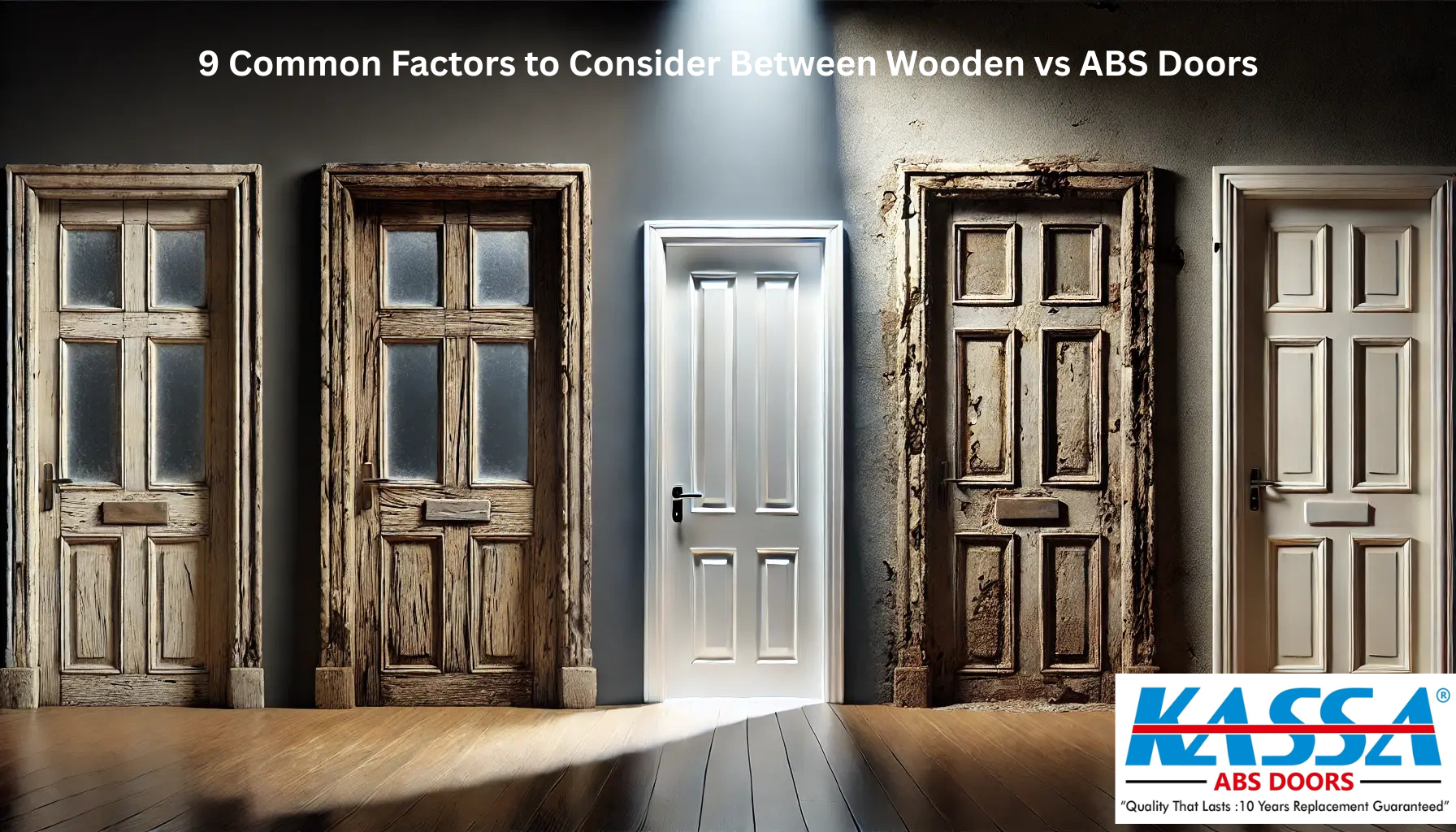Table of Contents
When it comes to selecting the perfect door for your home, you’re not just picking a piece of hardware, you’re choosing safety, style, durability, and comfort. Whether you’re remodelling or building a new space, ABS doors and wooden doors are two of the most common choices people weigh. But which one is better for your needs? Let’s break it down, starting with what they are.
What is a Wooden Door?
Wooden doors have long been a staple in traditional and modern homes. They offer timeless appeal and warmth and can be customised with carvings, finishes, and stains. Due to their classic look, they’re widely used in bedroom doors, room doors, and even kitchen doors.
However, doors of wood also come with downsides, they can warp, absorb moisture, and require regular maintenance, especially in high-humidity areas like restroom doors.
What is an ABS Door?
ABS doors (Acrylonitrile Butadiene Styrene) are engineered doors made from a thermoplastic polymer, reinforced with strong inner materials like PVC or composite. They’re designed to be lightweight, waterproof, termite-resistant, and highly durable. Due to their sleek appearance and strength, they’re increasingly favoured for room doors, kitchen doors, and bathroom doors where moisture and hygiene are critical concerns.
In this blog, we’ll explore 9 crucial factors you should consider before making your decision. We’ll also share real-life examples of people who have transformed their spaces using ABS doors, helping you emotionally and practically connect with your choice.
1. Material and Composition
The core difference lies in their construction. Timber doors are made from solid wood or engineered wood like MDF or plywood. They provide a premium feel but require maintenance to avoid issues like warping or termite infestation.
ABS doors, on the other hand, are engineered using high-quality polymer with a solid or semi-solid core. This gives them an edge in moisture-prone areas like kitchen entryways or washroom doors. They are lighter in weight and immune to rust and rot, making them a practical choice for modern homes.
2. Durability and Lifespan
In terms of long-lasting performance, ABS shines. They can easily handle rough use, which makes them ideal for kids’ rooms or rental properties. An ABS bedroom door installed by a family in Pune with young children lasted over 7 years without a scratch, unlike their old wooden door, which had to be polished every other year.
However, when properly maintained, wood doors can last decades, offering elegance that only natural wood can provide. The trade-off is in maintenance versus appearance.
3. Moisture Resistance
One of the biggest drawbacks of traditional wooden entryways is their poor moisture resistance. In humid regions or wet zones like bathrooms, they tend to swell, warp, or develop mould.
ABS doors, being water-resistant, are a game-changer for lavatory doors. Their seamless surface prevents water absorption. Many homeowners in coastal cities like Chennai have switched to ABS bathroom doors for precisely this reason, reporting zero maintenance and long-term savings. Explore ABS bathroom door models here.
4. Design and Aesthetic Flexibility
Wood gives you that rich, natural finish that’s hard to beat. It’s versatile for classic, vintage, or luxury interiors. Whether you’re looking for a carved room door or a minimalist style for your living room, wood delivers.
But doors made of ABS are no less. They come in a variety of modern textures, patterns, and colours. You can even mimic the look of wood with ABS laminates, perfect for people who want low maintenance without sacrificing beauty.
Websites like Livspace often showcase how ABS complement contemporary design, especially in modular kitchens.

5. Maintenance Needs
This is where ABS wins hands down. Doors made of ABS are easy to clean, just a simple wipe-down does the job. There’s no need for repainting, sanding, or polishing. That’s why many working professionals opt for ABS kitchen doors, especially in apartments.
Wood, while elegant, requires regular upkeep. Over time, you might need to deal with polish touch-ups, termite treatments, or warping issues.
6. Cost and Affordability
When it comes to pricing, doors made of ABS are significantly more cost-effective. For homeowners building or furnishing a house on a budget, ABS options allow you to cover multiple rooms like bedrooms, kitchens, and bathrooms, without breaking the bank.
Compare that to wooden entryways, where the cost of quality timber, polish, and labour can quickly escalate. For instance, a Delhi-based couple saved nearly ₹20,000 by switching to ABS door models for their entire apartment.
You can check affordable ABS door options here.
7. Eco-Friendliness
ABS is a recyclable material, and modern door manufacturers are creating environmentally friendly ABS doors using sustainable practices. This makes them a responsible choice in today’s climate-conscious world.
While wood is a natural material, the rising demand for its doors contributes to deforestation. Unless sourced from sustainable forests, they have a heavier environmental footprint.
Platforms like ArchDaily highlight this growing trend toward eco-conscious building materials.
8. Sound and Thermal Insulation
A thick wooden door offers better sound insulation. This makes it a good choice for bedroom doors or study rooms where quietness matters.
ABS doors, although soundproof to a decent extent, fall slightly behind in terms of insulation. That said, advancements in ABS technology are closing this gap, especially with hollow-core filled designs.
For most day-to-day residential applications, the difference is minimal.
9. Installation and Availability
ABS doors are pre-fabricated and easier to install. This reduces labour time and associated costs. Ideal for fast-moving construction projects or modular homes, they offer plug-and-play convenience.
Wooden entryways require customisation and skilled labour for fitting, sanding, and finishing. This can delay timelines.
Many modern door manufacturers are streamlining their catalogues with ready-to-install ABS door panels to meet growing demand.
Visit Kassa’s ABS Door Model page to explore a wide variety of ready-to-install designs.

Real-Life Transformations: What People Say
One Mumbai-based interior designer shared how her client, an elderly couple, switched to ABS room doors to avoid the maintenance hassle of traditional wood. Not only did their new doors require no upkeep, but the couple also felt safer knowing their bathroom doors were completely water-resistant.
Another Bengaluru-based startup installed ABS doors in all their office cabins. The result? A neat, uniform aesthetic with zero complaints from employees about stuck doors or creaking hinges.
Final Thoughts: Choose What Feels Right, But Make It Last
Choosing between wooden doors and ABS doors is more than a design decision, it’s about aligning with your lifestyle, needs, and long-term goals. Doors made of ABS are winning hearts for their affordability, durability, and low maintenance. Yet, wood door panels remain a timeless choice for those who prioritise natural aesthetics and a classic touch. It’s about building a space that feels like home.
If you’re looking to create a home that’s both functional and beautiful without the stress of high maintenance, explore the world of ABS doors. Let your next door be the one that welcomes comfort, elegance, and peace of mind.
Find your perfect ABS door at Kassa, where design meets durability, and quality meets affordability.
Still confused? Let Kassa help you make the right choice. Your home deserves the best; don’t settle for less.
FAQ’s
1. What are the key differences between wooden and ABS doors in terms of durability and maintenance?
ABS doors are highly durable, resistant to moisture, and require minimal upkeep, just occasional cleaning. In contrast, wooden doors, while sturdy, are prone to warping, termite damage, and need regular polishing or treatment. For households seeking a hassle-free solution, ABS doors are the more maintenance-friendly option.
2. How do wooden and ABS doors compare in terms of insulation properties?
Wooden doors generally offer superior sound and thermal insulation due to their dense structure. ABS doors provide decent insulation but may not match solid wood in noise reduction. However, modern ABS models with enhanced core materials are narrowing this gap, making them a good option for interior use.
3. What are the aesthetic and design considerations when choosing between wooden and ABS doors?
Wooden doors offer a natural, timeless appeal with rich grains and customizable carvings, ideal for traditional or luxury spaces. ABS doors, however, come in a wide range of sleek finishes, textures, and colours, suited for modern interiors. For those valuing design with low maintenance, ABS doors are a stylish alternative.
4. Which type of door is more cost-effective in the long run?
ABS doors are more cost-effective over time due to their low maintenance, resistance to moisture, and longer lifespan in high-traffic areas. Wooden doors may incur recurring costs for polishing and repairs. For long-term savings without compromising on quality, many homeowners prefer ABS options.
5. Are there environmental considerations when choosing between wooden and ABS doors?
Yes, wooden doors, unless sustainably sourced, contribute to deforestation. ABS doors, like those offered by KASSA, are often made using recyclable materials and eco-friendly manufacturing processes. Choosing ABS supports sustainability while reducing your environmental footprint.

